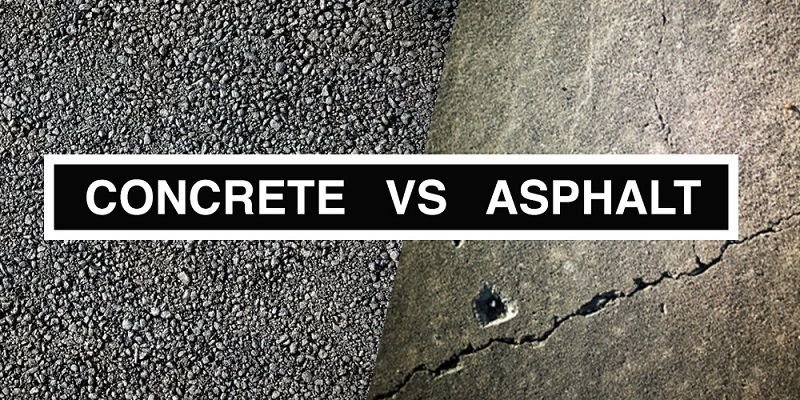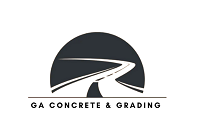Which is better a concrete or an asphalt driveway? For longer driveways asphalt is usually a better option due to is being slightly lower in cost. However concrete is the standard for your average driveway due to it’s durability and longevity. Asphalt may only last 10-20 years where concrete lasts 50+ years

Whether you’re building a new home or simply refreshing your driveway of your current home, the question of whether to use asphalt of concrete may come to mind. What are the differences and which is best for your application? These are all great questions to be asking.
There are pros and cons to each material and picking the right one for your project is essential. First, both products achieve the same results by providing a smooth driving/parking surface that you can count on.
This small details lead to a variety of differences between the materials. Here are five ways asphalt and concrete driveways differ.
1. Cost Differences Between Asphalt and Concrete Driveways
The cost of an asphalt driveway is typically more affordable than concrete, costing $3.00 to $5.00 per square foot. Asphalt prices tend to fluctuate with crude oil prices. In contrast, a concrete driveway costs between $5.00 and $8.00 per square foot for a standard installation. Finishes, stamps, and stains can increase the price tag to as much as $17.00 per square foot.
2. Maintenance and Repairs on Asphalt and Concrete Driveways
When you consider an asphalt driveway, you should understand the maintenance and repairs that accompany it. Generally, six months to a year after installation, an asphalt driveway should be sealed—and then sealed again every three to five years after. This will extend the life of the driveway and does not require a professional. With the right materials, many homeowners seal their own driveways.
However, concrete driveways don’t require as much sealing. Applying a seal to concrete driveways will enhance the look and preserve the finish, so many homeowners opt for this maintenance. The only maintenance need on a concrete driveway is cleaning various oil stain that your vehicle may leave behind.
Cracks affect both asphalt and concrete driveways and should always be repaired. Homeowners will find that asphalt cracks are easier to fix and result in more aesthetically pleasing repairs. Asphalt can be recapped if damaged or worn. This recapping process may not need as much material therefore costing less than the initial paving. Concrete will usually need to be broken up and hauled off and repoured, however concrete is much more durable than asphalt.
3. Asphalt vs. Concrete Differences in Lifespan and Durability
Overall, the difference between asphalt and concrete driveways is that asphalt is less durable than concrete. With proper maintenance, it can last 10-20 years. Alternatively, concrete provides a sturdy, long-lasting option and can last homeowners 50+ years with occasional repairs and degreasing. One important note here is tree roots can effect both materials yet asphalt the damage is localized lifting. With a concrete driveway the roots may lift the whole section and cause large cracks and separation. Asphalt has the ability to move bit and contour to the ground.
4. Aesthetics and Design of Asphalt vs. Concrete Driveways
When it comes to the aesthetics of your driveway, pavement material plays an important role. You can stain, tint, etch or stamp a concrete driveway to get a desired look. Finishes provide alternative colors or hues to the natural off-white, grayish color of concrete. There are hundreds of options to make concrete look how you want.
Asphalt, however, must be rolled and compressed during installation. It only comes in one color, black. Some sealants contain tints or coloring, but options are generally limited to black.
5. Asphalt vs. Concrete How Climate Effects Each
Homeowners living in very cold or hot regions should consider how climate affect their pavement option between asphalt and concrete driveways. In cold winters, concrete may crack from constant freezing and thawing, and road salt can eat away at the surface causing spalling. Hot climates affect asphalt driveways causing them to become softer. In the hot sun asphalt tar can stick to shoes, clothing, and car tires.
To recap, there are many differences between asphalt and concrete driveways. Here are a few takeaways to remember.
Asphalt Driveways
- Asphalt is less expensive
- Asphalt is a softer material, leading it to deteriorate faster and easier to repair than concrete
- Asphalt only lasts 10-20 years
- You do not have the same options as concrete with stamps and stains
- It requires occasional resurfacing and resealing every three to five years
- Although it requires more maintenance, asphalt repairs are easier than concrete
For these reasons, asphalt driveways aren’t best for busy families that will have a lot of driveway traffic and heavy vehicles. But, for those of you looking for a cost-efficient option with a clean and sleek look, asphalt is the right choice. What we tend to see is longer driveways have asphalt on long stretches and concrete near the house where there is a lot of turning and constant weight.
Concrete Driveways
- Concrete is more durable than asphalt
- Because it is a less flexible material, and many people turn to concrete patching products
- Concrete offers 50+ years of use
- Low maintenance is required only occasional degreasing/pressure washing
- Concrete driveways offers more opportunities for creative appearance. It can be stamped with patterns, tinted to different colors, given different finishes
- Though it is more durable overall, when damages do occur, concrete repair is harder and costlier than asphalt repair
If you’re looking for a driveway that may be a larger investment upfront but will last forever and offers customizability, look into concrete driveway. This option is great for homeowners who plan to stay in their current home for many years and need an option that can withstand a long life. To learn more about concrete visit the American Concrete Institute.
So…
Overall, there are many factors to think about when choosing an asphalt vs. concrete driveway. Appearance, initial cost, and possible driveway repair and maintenance needs are all things to consider. Plus, more specific questions such as the climate you live in, the wear and tear you might exert on the driveway, and any HOA restrictions you may have as well.
Be sure to check out some of our other blog posts where we answer some of the most commonly asked questions from our customers.
Can you pour concrete in freezing weather?
How long does it take concrete to cure?
For more information on GA Concrete & Grading and the products and services that we offer, please Contact us today, as we look forward to hearing from you.
